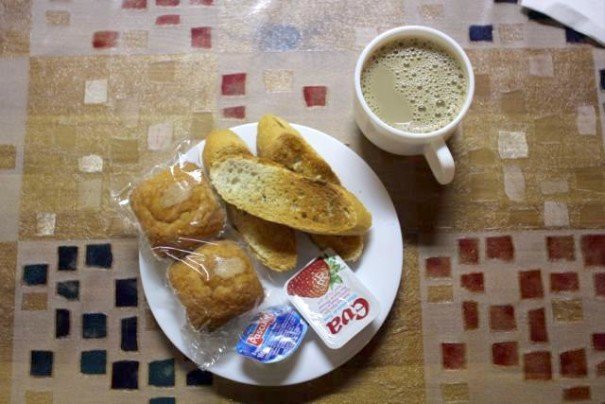
At Least There Are Muffins on the Road to Redemption

At Least There Are Muffins on the Road to Redemption
Baked Goods on the Camino de Santiago
Breakfast on the Camino de Santiago is anything but what it should be. When you sit down for breakfast before setting off for another chunk of the nearly 500-mile trek across northern Spain that constitutes the pilgrimage, your fuel for the daily race for a bed is likely to be bread, butter, jam, a mediocre cup of coffee and, if you’re lucky, something sweet.
And so it was when I woke up in my bunk bed in Castrojeriz, a medieval village about halfway to Santiago de Compostela. The loud rustling of pilgrims packing their backpacks had started before sunrise this morning in May, causing people to complain about lack of sleep as they shuffled to the communal table in the dining room. My limbs were stiff and sore after yesterday’s walk and yet another night in yet another bunk bed. I felt the bruises left on the small of my back by my backpack as I waited in line for the coffee; after two weeks of walking, finally they were getting smaller.
I sat down on the bench and took a sip of coffee. It smelled nice but tasted slightly sour; still it was the best part of the meal. My neighbor passed me the breadbasket containing the leftover bread from yesterday’s dinner, sliced up and toasted. Another basket contained small portions of processed strawberry jam and butter; the last one offered muffins wrapped in plastic, two per person. I stored away the muffins and munched away on the stale bread. Most people ate quickly and silently, eager to get out the door. A group of three Canadian sisters in their fifties broke the silence as they bent over their guidebook trying to decide how far to walk that day.
“I think we should aim for Frómista,” one of them said. “It’s less than 27 kilometers.”
Her younger sister shook her head.
“It’s too far, we won’t make it before the beds start filling up. Let’s just go to Boadilla del Camino, that will save us an hour or two of walking,” she said.
Besides blisters, the overcrowdedness of the camino was the favorite topic of conversation among the pilgrims; a record 250,000 people were expected to walk the way of Saint Jacques this year. Popular books and movies about the camino and other popular treks such as the Pacific Crest Trail, featured in the blockbuster Wild, had caused a surge in people walking the camino for non-religious purposes, myself included. The popularity of the pilgrimage had turned what was supposed to be a religious or contemplative month of walking into a daily race for a place to lay your head. I quickly finished my meal, knowing I’d have three more competitors for a bed in Boadilla.
Our smelly walking boots were lined up on racks in the courtyard. I covered my feet in Vaseline to prevent more blisters, put on my newly-purchased specialty hiking socks and boots and was out of the door 20 minutes after I’d been awakened.
The air was cold and crisp, the sun had just begun to rise. I walked fast, determined to make the most of the first few glorious hours of walking where my legs still felt strong and my backpack not too heavy. Ahead of me a massive mountain rose, promising my limbs would be sore and stiff again tomorrow. Whatever diminutive energy my unhealthy breakfast had given me had already begun to evaporate. At least I had the muffins.